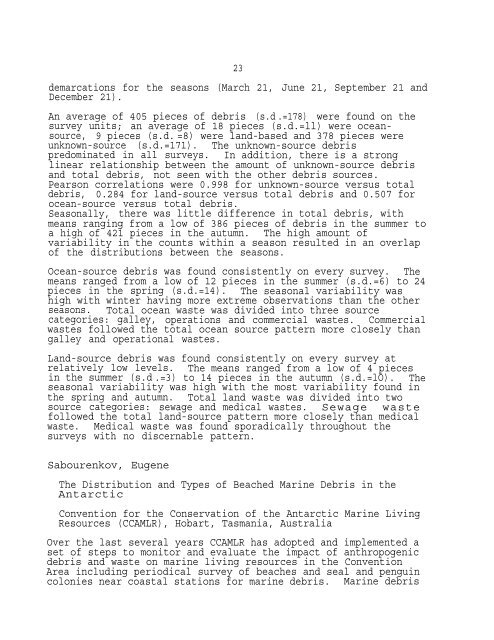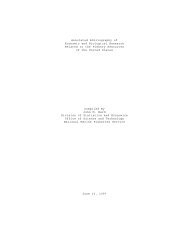Poster abstracts and manuscripts from the Third International ...
Poster abstracts and manuscripts from the Third International ...
Poster abstracts and manuscripts from the Third International ...
Create successful ePaper yourself
Turn your PDF publications into a flip-book with our unique Google optimized e-Paper software.
23<br />
demarcations for <strong>the</strong> seasons (March 21, June 21, September 21 <strong>and</strong><br />
December 21).<br />
An average of 405 pieces of debris (s.d.=178) were found on <strong>the</strong><br />
survey units; an average of 18 pieces (s.d.=ll) were oceansource,<br />
9 pieces (s.d. =8) were l<strong>and</strong>-based <strong>and</strong> 378 pieces were<br />
unknown-source (s.d.=171). The unknown-source debris<br />
predominated in all surveys. In addition, <strong>the</strong>re is a strong<br />
linear relationship between <strong>the</strong> amount of unknown-source debris<br />
<strong>and</strong> total debris, not seen with <strong>the</strong> o<strong>the</strong>r debris sources.<br />
Pearson correlations were 0.998 for unknown-source versus total<br />
debris, 0.284 for l<strong>and</strong>-source versus total debris <strong>and</strong> 0.507 for<br />
ocean-source versus total debris.<br />
Seasonally, <strong>the</strong>re was little difference in total debris, with<br />
means ranging <strong>from</strong> a low of 386 pieces of debris in <strong>the</strong> summer to<br />
a high of 421 pieces in <strong>the</strong> autumn. The high amount of<br />
variability in <strong>the</strong> counts within a season resulted in an overlap<br />
of <strong>the</strong> distributions between <strong>the</strong> seasons.<br />
Ocean-source debris was found consistently on every survey. The<br />
means ranged <strong>from</strong> a low of 12 pieces in <strong>the</strong> summer (s.d.=6) to 24<br />
pieces in <strong>the</strong> spring (s.d.=14). The seasonal variability was<br />
high with winter having more extreme observations than <strong>the</strong> o<strong>the</strong>r<br />
seasons. Total ocean waste was divided into three source<br />
categories: galley, operations <strong>and</strong> commercial wastes. Commercial<br />
wastes followed <strong>the</strong> total ocean source pattern more closely than<br />
galley <strong>and</strong> operational wastes.<br />
L<strong>and</strong>-source debris was found consistently on every survey at<br />
relatively low levels. The means ranged <strong>from</strong> a low of 4 pieces<br />
in <strong>the</strong> summer (s.d.=3) to 14 pieces in <strong>the</strong> autumn (s.d.=lO). The<br />
seasonal variability was high with <strong>the</strong> most variability found in<br />
<strong>the</strong> spring <strong>and</strong> autumn. Total l<strong>and</strong> waste was divided into two<br />
source categories: sewage <strong>and</strong> medical wastes. Sewage waste<br />
followed <strong>the</strong> total l<strong>and</strong>-source pattern more closely than medical<br />
waste. Medical waste was found sporadically throughout <strong>the</strong><br />
surveys with no discernable pattern.<br />
Sabourenkov, Eugene<br />
The Distribution <strong>and</strong> Types of Beached Marine Debris in <strong>the</strong><br />
Antarctic<br />
Convention for <strong>the</strong> Conservation of <strong>the</strong> Antarctic Marine Living<br />
Resources (CCAMLR), Hobart, Tasmania, Australia<br />
Over <strong>the</strong> last several years CCAMLR has adopted <strong>and</strong> implemented a<br />
set of steps to monitor <strong>and</strong> evaluate <strong>the</strong> impact of anthropogenic<br />
debris <strong>and</strong> waste on marine living resources in <strong>the</strong> Convention<br />
Area including periodical survey of beaches <strong>and</strong> seal <strong>and</strong> penguin<br />
colonies near coastal stations for marine debris. Marine debris
















